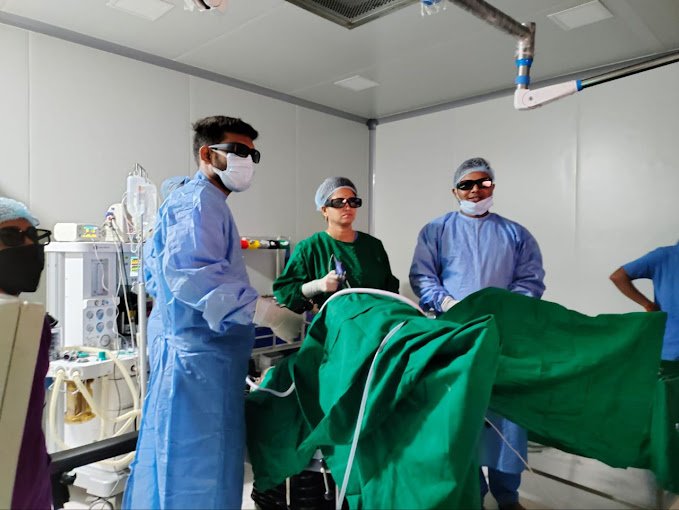
At Women Wellness Clinic, we offer comprehensive sterilization and contraception services to provide individuals with safe and effective options for family planning and reproductive health management. Whether you're considering permanent sterilization or seeking temporary contraception, our experienced healthcare professionals are here to help you make informed decisions and find the right solution for your needs.
Sterilization Options:
a. Tubal Ligation (Female Sterilization): Tubal ligation is a permanent sterilization procedure for women that involves blocking or sealing the fallopian tubes to prevent eggs from reaching the uterus for fertilization. This procedure is typically performed laparoscopically under general anesthesia and is highly effective in preventing pregnancy.
b. Vasectomy (Male Sterilization): Vasectomy is a permanent sterilization procedure for men that involves sealing or cutting the vas deferens, the tubes that carry sperm from the testicles to the urethra. This prevents sperm from being ejaculated during intercourse and effectively prevents pregnancy. Vasectomy is a minimally invasive procedure performed under local anesthesia.
Contraception Options:
a. Hormonal Methods:
Oral Contraceptives (Birth Control Pills): Birth control pills contain synthetic hormones that prevent ovulation, thicken cervical mucus to prevent sperm from reaching the egg, and thin the lining of the uterus to prevent implantation. They are taken daily and are highly effective when used correctly.
Contraceptive Patch: The contraceptive patch is a small, adhesive patch worn on the skin that releases hormones similar to those in birth control pills. It is applied once a week and offers similar effectiveness to oral contraceptives.
Contraceptive Ring: The contraceptive ring is a flexible plastic ring inserted into the vagina that releases hormones to prevent ovulation. It is worn for three weeks and removed for one week during menstruation.
Hormonal Injections: Hormonal injections, such as Depo-Provera, are administered every three months to prevent ovulation and thicken cervical mucus, effectively preventing pregnancy.
b. Long-Acting Reversible Contraception (LARC):
Intrauterine Device (IUD): An IUD is a small, T-shaped device inserted into the uterus to prevent pregnancy. It can be hormonal (releasing progestin) or non-hormonal (copper), and it provides long-term contraception, lasting up to 3 to 10 years, depending on the type.
Contraceptive Implant: The contraceptive implant is a small, flexible rod inserted under the skin of the upper arm that releases hormones to prevent ovulation. It provides up to three years of effective contraception.
c. Barrier Methods:
Male Condom: The male condom is a thin sheath worn over the penis during intercourse to prevent sperm from entering the vagina. It also provides protection against sexually transmitted infections (STIs).
Female Condom: The female condom is a pouch inserted into the vagina before intercourse to prevent sperm from entering the uterus. It also provides protection against STIs.
Diaphragm or Cervical Cap: The diaphragm or cervical cap is a flexible silicone or rubber device inserted into the vagina to cover the cervix and prevent sperm from entering the uterus. It is used with spermicide and must be fitted by a healthcare provider.
d. Natural Methods:
Fertility Awareness-Based Methods: Fertility awareness-based methods involve tracking menstrual cycles, basal body temperature, and cervical mucus changes to identify fertile and non-fertile days. These methods require regular monitoring and may not be as effective as other forms of contraception.
Withdrawal (Pull-out Method): Withdrawal involves the man withdrawing his penis from the vagina before ejaculation to prevent sperm from entering the vagina. It is not highly effective and does not protect against STIs.
Counseling and Education:
Our healthcare professionals provide comprehensive counseling and education on the various contraceptive options available, including their effectiveness, benefits, risks, and side effects. We help you understand the pros and cons of each method and tailor our recommendations to your individual needs, preferences, and medical history.
Procedure and Follow-Up:
Whether you choose sterilization or contraception, our team ensures that the procedure is performed safely and effectively. For sterilization procedures such as tubal ligation or vasectomy, we provide preoperative counseling, perform the procedure using minimally invasive techniques, and offer postoperative care and follow-up to monitor your recovery.
Long-Term Support:
We offer long-term support and monitoring to ensure your continued satisfaction and effectiveness with your chosen contraceptive method. We encourage open communication and are here to address any questions, concerns, or changes in your contraceptive needs over time.
If you're considering sterilization or contraception and would like to learn more about your options, we encourage you to schedule a consultation with our experienced team at Women Wellness Clinic. We are committed to providing personalized care, support, and guidance to help you make informed decisions and achieve your reproductive health goals.